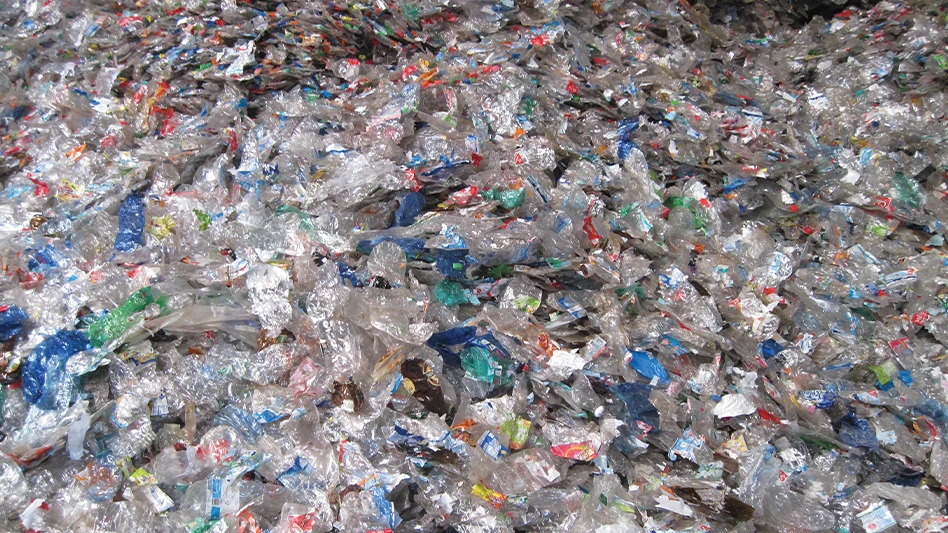
Recycling Today archives
The National Association for PET Container Resources (NAPCOR), based in Charlotte, North Carolina, has released a life cycle assessment (LCA) comparing polyethylene terephthalate (PET) plastic, glass and aluminum carbonated soft drink (CSD) and still water beverage container systems, saying the assessment found PET bottles are significantly better for the environment.
The assessment, an update on a similar 2009 study, was completed by Franklin Associates, an Overland Park, Kansas-based LCA consulting firm, and went through an extensive peer review and verification process. NAPCOR claims the findings unequivocally show that when it comes to the best beverage packaging for the environment, the answer is PET.
RELATED: US PET recycling rate posts modest increase in 2021
Per the study, plastic packaging made from PET is used in more than 70 percent of beverage containers because it is lightweight, clear and 100 percent recyclable. Additionally, compared with glass and aluminum beverage containers, these bottles create less solid waste, use less water during production and generate fewer emissions that contribute to acid rain and smog.
The study shows that if U.S. consumers selected PET bottles instead of glass bottles for their CSDs over the course of one year, it would be equivalent to the amount of greenhouse gas emissions avoided by recycling instead of landfilling nearly 53,000 garbage trucks of waste and the carbon sequestered by adding almost 1.3 million acres of U.S. forest.
Similarly, if U.S. residents choose PET bottles instead of aluminum cans for their CSDs over the course of one year, the report says resulting impacts would be the same as conserving 4.4 billion liters of water; removing 688,000 gas-powered cars from the road annually; and diverting 138 million bags filled with trash for recycling versus landfills.
The LCA found that a 16.9-ounce PET water bottle compared with a 12-ounce aluminum can creates 80 percent less solid waste; uses 53 percent less water during production; has 74 percent lower global warming potential; and generates 68 percent to 83 percent fewer emissions that contribute to the formation of acid rain and smog.
“The LCA scientifically and credibly demonstrates how plastic packaging provides significant environmental benefits that will help the world meet its vital net-zero carbon targets,” NAPCOR Executive Director Laura Stewart says. “A PET bottle is 100 percent recyclable and can be made with 100-percent-recycled content. The LCA’s results should be empowering for businesses and consumers because we can confirm once again that choosing PET plastic beverage containers is the best option for the planet."
She continues, “We are sensitive to the additional issue of waste management that comes with any discussion of packaging. By conducting the LCA we hope to better inform consumers, brands and legislators about their packaging options and the impact on the environment. At NAPCOR, we are committed to working closely with our partners, customers and community members to increase the rates of plastic recycling. The full benefits of choosing PET come about when we recycle it.”
The study, which took place over a span of eight months, defines an LCA as a scientific method for evaluating the environmental benefits and tradeoffs for the entire life cycle of a product, from its beginning with raw material extraction, through production use, reuse and recycling (if applicable) and final disposition.
In its conclusion, NAPCOR says, “This report should serve as the impetus for increased PET packaging among beverage brands, expanded shelf space in retail outlets for products packaged in PET and strong legislation to keep sustainable choices such as PET beverage packaging in use. Further, the accompanying infrastructure to accelerate these changes needs to happen concurrently to drive tangible environmental change. That includes increased recycling rates and capabilities nationwide.”
Latest from Recycling Today
- BMW Group, Encory launch 'direct recycling’ of batteries
- Loom Carbon, RTI International partner to scale textile recycling technology
- Goodwill Industries of West Michigan, American Glass Mosaics partner to divert glass from landfill
- CARI forms federal advocacy partnership
- Monthly packaging papers shipments down in November
- STEEL Act aims to enhance trade enforcement to prevent dumping of steel in the US
- San Francisco schools introduce compostable lunch trays
- Aduro graduates from Shell GameChanger program





